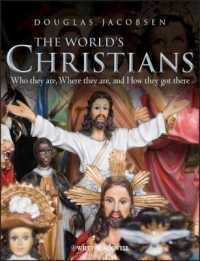- ホーム
- > 洋書
- > 英文書
- > Literary Criticism
Full Description
Re-Reading The Excursion: Narrative, Response and the Wordsworthian Dramatic Voice is a groundbreaking study, which transforms contemporary critical understanding of The Excursion and of the place of this long poem in the Wordsworthian canon. Sally Bushell argues that the poem, which has suffered at the hands of critics for most of the twentieth century, has been unfairly judged according to a Coleridgean rather than a Wordsworthian definition of "philosophy"-that it has been read as a didactic work, rather than one which uses its dramatic form to teach its readers to think for themselves. She offers a new reading in which The Excursion is shown to be about providing the readers with moral habits and mental constructs by which to learn, not simply telling them what to think. The book begins with a discussion of the reception of the poem in 1814, considering the responses of Coleridge, Hazlitt, Francis Jeffrey and Charles Lamb. This historicized discussion is then balanced by a reading of the poem at the compositional stage, looking at the emergence from the manuscripts of a Wordsworthian dramatic voice. The author goes on to argue that the poem's philosophy is performative-that is, concerned with the way in which moral ideas can best be communicated, as much as with the ideas themselves. She then shifts her attention to consider how this operates in relation to the reader, considering the importance of context in relation to emotional response. Later, the epitaphic books are reconsidered in the light of Wordworth's critical writing; Bushell argues that the significance of the epitaph for him lies in its values as a poetic form in which the text itself is released from poetic authority. Finally, the author looks back at The Prelude from the perspective of The Excursion and shows how the later poem attempts to value the ordinary, rather than the poetic, mind. The conclusion reached is that Wordsworth is not just the "egotistical" poet of The Prelude, interested largely in the development of his own imaginative powers, but one who goes on to explore the limits of subjectivity and the importance of different kinds of imaginative links between individuals.
Contents
Contents: Introduction; The poet's voice: Disappointed expectations; Ventiloquizing through another man's mouth: Coleridge; Impertinent babbling: Hazlitt and Jeffrey; The voice of speaking communication: Lamb; Dramatic composition, dramatic definition: Defining the dramatic poem; Internalised dramatic conventions; Indirectness; In which they differ: characterisation; In which they resemble each other: textual transposition; Dramatic composition; A performative philosophy: Context or content: i. ideology; Context or content: ii. Religion; Performative structures: i. Dialogue; Performative structures: ii. Walking and talking; A context for response: The historical context: reading aloud; Contextualising affective response; The poetic context: i. The embedded narrative; The poetic context: ii. Retelling Margaret's tale; Making the reader active: Doubling response: Margaret and the sentimental; Unsettling the reader; The twice-told tale; The problem of the poet; Different ways of seeing: Seen through a tender haze: the epitaph form; We see, then, as we feel: subjective difference; Meeting at the midway point: subjective transcendence; Narrative Memory: The minds of men; Telling tales in The Prelude; Narrative memory in The Excursion; Narrative memory and the poetic act; The poet and his community; Bibliography; Index.







